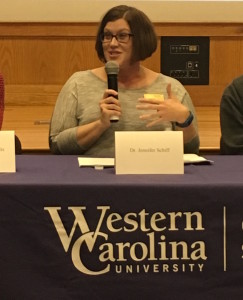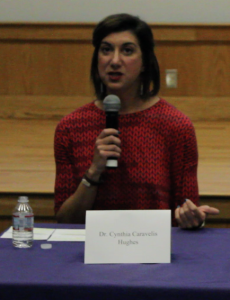Video created by Kayla Brookshire.
After the ‘Intentional Conversations’ political panel on Thursday, March 3, we gathered some audience opinions about how the panel helped students understand certain aspects of our government and what they ultimately learned from the discussion.
The speakers covered topics like prison reform, foreign policy, feminism, voting policies and even voter suppression.

Jennifer Schiff speaking on foreign policy at the ‘Intentional Conversations’ panel
According to the students we talked to, the most informational topic discussed was the issue of foreign policy. Foreign policy seems like it is just that, a foreign topic to most Americans, especially to young voters. Foreign policy is not something that is typically discussed in everyday conversation; it’s not even really covered in any college class other than those required for Political Science majors.
Jennifer Schiff, an assistant professor in the Political Science and Public Affairs Department, explained what foreign policy actually encompasses and why it is important to the presidential election (and all other elections as well).
Another topic that students agreed was very informative was Dr. Caravelis’ discussion on prison reform.
Gillian McNamara, a freshman forensic science major at WCU, says that she was very interested in learning about the public health aspect of prison reform and how providing public services like health and education could lower crime rates.
Dr. Cynthia Caravelis, an assistant professor in the Criminal Justice Department, spoke on the topic of prison reform and she explains that the United States spends about $39 billion a year on prison inmates. She continued the discussion by bringing up taxes.

Dr. Cynthia Caravelis speaking about prison reform
“Now, when people discuss where they want their tax dollars to go, they don’t want them to go anywhere, but here’s the issue: we have to support people,” Caravelis says. “If we don’t support them on the front-end, through education or social services, we will pay on the back-end through incarceration, and I guarantee you it is far more expensive to incarcerate people than it is to actually educate them to begin with.”
Each of the panelists provided students with helpful information about the upcoming election and general knowledge about topics including feminism, voter rights and suppression, and even information about the presidential elections concerning delegates and super delegates.
Overall, the students and other audience members found the panel to be very informative, and each of them agreed that it was a great way to inspire students to go out and vote and let their voice be heard.
David Johnson contributed in the interviewing of the students.


